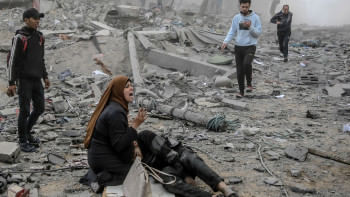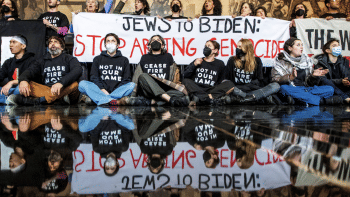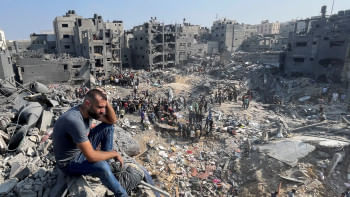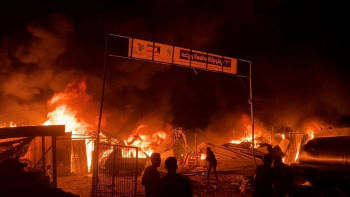Another year of devastation for the Palestinians

Imagine waking up each morning to the sound of sirens echoing through your neighbourhood, the uncertainty of safety as you send your children to school, and the constant fear of losing everything you hold dear. This is the harsh reality many Palestinians face daily: a life filled with resilience and courage amid overwhelming challenges.
For many Palestinian children, growing up has meant playing in the shadows of conflict rather than playgrounds. Bombings have turned schools into ruins. The destruction of schools like the al-Fakhoura School in Gaza, and the attack on al-Awda School that killed several students, have left permanent scars on the community. Mental trauma often runs deeper than physical wounds, with many children showing signs of PTSD, recurring nightmares, and developmental delays. Some families have described the struggle of explaining war to their children while trying to shield them from its harsh realities.
Healthcare workers serve as silent heroes, tending to trauma patients in overwhelmed hospitals. Blockades choke the supply of critical medicines, while damaged facilities struggle to keep pace with rising public health crises. Clean water remains a luxury for many, with outbreaks of cholera and hepatitis A compounding the challenges in the already fragile healthcare system. Tragically, numerous doctors have been targeted and killed in the line of duty, including the deadly February 2024 strike on al-Quds Hospital, further weakening the healthcare system and leaving communities with limited medical support. The death of Dr Ayman Abu al-Ouf during an earlier airstrike remains a painful reminder of the toll taken on the medical community.
Journalists brave these conditions daily, risking their lives to share untold stories with the world. The 2022 death of Shireen Abu Akleh, a veteran journalist shot while covering a raid, sparked international outrage and brought renewed focus to the dangers journalists face in conflict zones. In 2024, reports surfaced of media personnel being deliberately targeted during coverage of clashes, further emphasising the dangers faced by journalists seeking to document human rights violations in Palestine.
Inside Israel, opinions on the conflict remain deeply divided. While some citizens support security measures in response to the ongoing violence, others have taken to the streets in opposition to the expansion of settlements and the government's aggressive policies. Protests in Tel Aviv and Haifa in March 2024 reflected the growing rift, with a significant portion of Israeli society calling for immediate diplomatic resolutions and an end to the occupation.
Europe's involvement in the Palestinian struggle has been both direct and indirect. Some European nations, including Germany and the UK, have provided diplomatic backing for Israel, while others have called for accountability and human rights protection. In February 2024, the Netherlands' Supreme Court halted the export of F-35 jet parts to Israel, citing serious violations of international humanitarian law. Grassroots movements across Europe, such as massive protests in London, Paris and Madrid, have called for an end to the occupation and greater support for Palestinian self-determination, leading to unprecedented debates in the European Parliament about sanctions and arms embargoes.
In the Middle East, the roles of actors such as Iran, Saudi Arabia and Turkey continue to shape the Palestinian landscape. Iran has openly supported Palestinian factions like Hamas with financial and military aid, while Saudi Arabia has taken a more cautious diplomatic approach, balancing regional alliances with public sympathy for Palestinians. Turkey, under President Recep Erdogan, has frequently condemned Israeli actions and provided humanitarian aid to Gaza, though its involvement has fluctuated with diplomatic shifts. Meanwhile, Syria's re-entry into regional diplomacy has introduced further complexities, with Israeli airstrikes targeting Iranian-linked militias in Damascus throughout 2024, escalating regional tensions.
Political shifts in Israel have also played a decisive role in shaping the conflict's trajectory. Benjamin Netanyahu's government has solidified hardline policies, emphasising security concerns while often ignoring humanitarian issues. The 2024 Knesset passed sweeping legislation that expanded settlement activities in the West Bank, leading to mass protests from both Israeli and Palestinian communities. These policies have exacerbated tensions, with military raids in refugee camps becoming increasingly frequent, including the devastating May 2024 raid in the Jenin camp, which resulted in multiple civilian casualties and drew sharp criticism from the United Nations.
Social media has become a battleground for debates over the Palestinian conflict. Throughout 2024, platforms like X and Instagram have been flooded with images of bombed-out homes and stories of loss, while misinformation campaigns and heated debates have further polarised public opinion. Hashtags such as #EndTheOccupation and #StopArmingIsrael have trended globally, amplifying the voices of activists demanding accountability. Viral videos capturing forced evictions and settler violence in East Jerusalem have heightened global awareness but also sparked ideological divides, with influencers and journalists playing a critical role in amplifying these narratives.
The humanitarian crisis in Gaza has only worsened. The blockade has strangled economic life, forcing over 80 percent of residents to depend on international aid for survival. The February 2024 Israeli airstrikes on Rafah displaced thousands and left entire neighbourhoods in ruins, prompting urgent calls for humanitarian corridors to be opened. The United Nations Relief and Works Agency (UNRWA) has struggled to keep up with the rising demand for aid, while funding cuts have further strained its operations. Families often face impossible choices between securing food and medicine, with international relief organisations citing access restrictions as a significant barrier.
The West Bank has also experienced a surge in tensions, marked by increased military raids and settlement expansions. Violent clashes between settlers and Palestinians have resulted in multiple fatalities, such as the tragic March 2024 raid on the Jenin refugee camp where at least four Palestinians were killed. Entire communities have been uprooted, with limited accountability for settler violence. Palestinian men and children continue to face arbitrary detentions, with many held without formal charges under Israel's policy of administrative detention. Reports of abuse in Israeli prisons, including physical violence, psychological mistreatment, and denial of medical care, have drawn sharp criticism from international human rights organisations. The detention of children as young as 12, often without access to legal representation, remains a pressing concern for global human rights advocates.
Despite these challenges, the resilience of the Palestinian people has remained unwavering. Their steadfastness in the face of hardship continues to inspire global solidarity and demands for justice. The path to peace demands more than temporary ceasefires; it requires accountability, the lifting of blockades, and a global commitment to genuine dialogue rooted in human rights. The world cannot afford to look away. The voices of Palestine's children, healthcare workers, journalists, and families must echo loudly, for they embody the true narrative of resilience, resistance, and the unwavering hope for freedom.
Sarzah Yeasmin is a Boston-based writer and contributor to The Daily Star. She is an alumna of Harvard University.
Views expressed in this article are the author's own.
We welcome your contributions and analysis of global events, and responses to our articles. To submit articles to Geopolitical Insights, please send an email to [email protected].
Follow The Daily Star Opinion on Facebook for the latest opinions, commentaries, and analyses by experts and professionals. To contribute your article or letter to The Daily Star Opinion, see our submission guidelines.

 For all latest news, follow The Daily Star's Google News channel.
For all latest news, follow The Daily Star's Google News channel. 













Comments